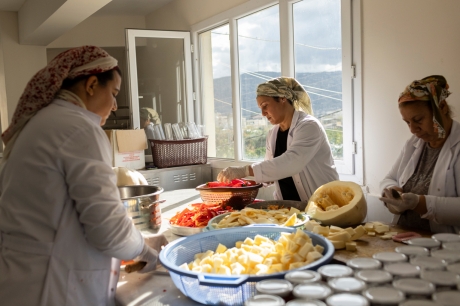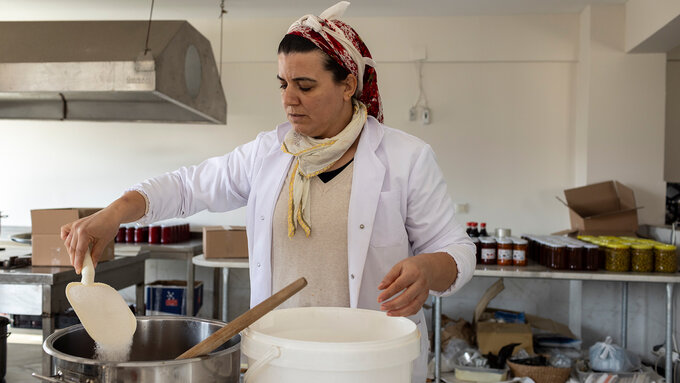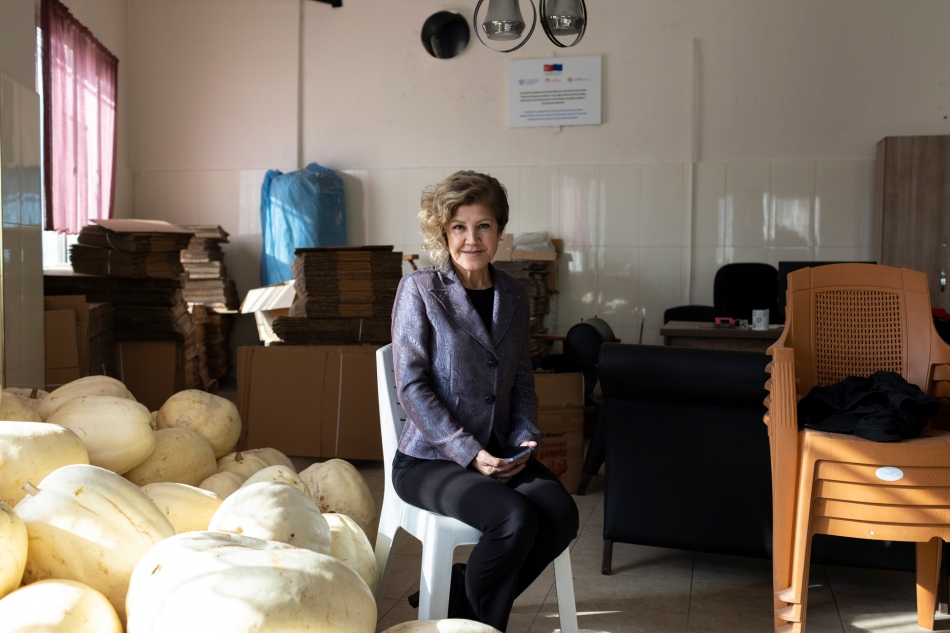
For women of the cooperative, the economic empowerment has also challenged traditional gender roles within households. ©FAO/Bradley Secker
Hatay: When a devastating earthquake hit Türkiye in 2023, its southeastern Anatolia region and 11 provinces were affected, among them was Hatay where Kudret Çiğdem and Atiye Sönmez Erdoğdu, founder of a women-led cooperative, lived.
The earthquake had a profound impact on the region, leaving thousands without basic necessities and unable to resume their livelihoods. Ninety per cent of Samandağ was destroyed and almost everyone lost loved ones, says Atiye. She was also left homeless and had to live out of her car for some time.
The earthquake also destroyed Çiğdem’s house and her newfound livelihood was threatened. Raised in a household where women were discouraged from working outside the home, Çiğdem had never experienced financial independence. After she got married, she was a homemaker and mother, taking care of her three children.
“I got money in my pocket for the first time with the cooperative,” reflects Çiğdem. “Our father did not want his daughters to work… But I had always wanted to work and contribute. I have potential, but because there was no support around me, we stayed closed, like a closed box.”
It was in 2019, that Çiğdem Kudret realized for the first time that the skills she had — making jams, pickles, spice mixes and tomato paste— could be monetized. This revelation came about because of a class she took at the local Samandağ Women’s Cooperative, and it ignited a passion in her for entrepreneurship and economic self-sufficiency.
The cooperative, operational since 2020, was founded by Atiye, a member of the local city council. For women in the community, the cooperative provided more than just a source of income, it offered a sense of community and empowerment. It was the first women’s cooperative to be established in the Hatay province of southern Türkiye.
“When I come here, I feel the peace that you have when you arrive home. I feel that here..Atiye helped me to become a trainee. Once I walked through that door, a light turned on in my life. And I didn’t want to turn off that light,” says Çiğdem.
Established in 2019, the cooperative’s jam production course, in collaboration with the Turkish Employment Agency and the Public Education Center, provided a platform for skill development. An advertisement in the local press attracted 25 women, including Çiğdem. Following six months of intensive training, she joined the production team.
“Our goal was to set an example and open the way,” says Atiye.
Following in the footsteps of this cooperative, seven others were established in Samandağ, and thirty cooperatives were founded in Hatay province. A financial advisor by profession, Atiye works pro bono at the cooperative, managing their accounts and providing legal aid.
However, the cooperative too had suffered significant losses because of the earthquakes, leaving only 10 per cent of their products salvageable.
“After the earthquake, we went into a major depression. The children pressured us to leave the city. Otherwise, I did not want to leave this place. After that I felt a sense of emptiness, like it [the cooperative] was a second home had I abandoned. I felt like I had to go back,” Çiğdem says.

Now, as Türkiye rebuilds in the aftermath of the earthquakes, women-led cooperatives are empowering women to be resilient and are providing them with a path to economic independence and rebuilding their lives.

Despite the personal loss in the earthquake, Atiye was determined to keep the cooperative running. With the support of the Food and Agriculture Organization of the United Nations (FAO), she obtained a new laptop and relaunched the cooperative’s e-commerce efforts. She rallied other members, encouraging those who had left the area to return and resume production despite the challenges.
FAO, which had been supporting the cooperative even before the earthquake, stepped in to help the collective get back on its feet. By providing machinery and equipment, FAO ensured that women-led cooperatives received the help they needed to rebuild and recover.
Such initiatives, FAO said, aligned with its commitment to invest in gender equality and women’s empowerment in agrifood systems. These go a long way in advancing progress and enhancing the resilience and food security of households and communities.
Çiğdem also returned to Samandağ and resumed her work at the cooperative, though still living in a tent.
Atiye emphasizes the importance of these cooperatives in post-disaster recovery. “The women come to the cooperative from these tents and heal as they speak to each other and engage in producing,” says Atiye. ” In the evening as they leave, they take their daily pay and contribute to their own economies… Therefore, we contribute to their healing, economically, socially and psychologically.Neşe Çakır Sayran, FAO Gender Specialist, underscores the significance of investing in women’s capacity and knowledge.
“Women’s empowerment is not only economic but also social and cultural… This empowerment leads to women’s participation in decision-making processes, which is particularly important,” explains Sayran.
Indeed, the cooperative has not only provided a source of income but has also challenged traditional gender roles within households.
“When women say they are going out of the house to make money, they are respected more by their spouses,” says Atiye. “When they get back home, the sharing of household labour is easier.”
Atiye believes that the cooperatives have played a crucial role in bridging the gap between unpaid work and economic empowerment. ” One thing we have concretely achieved in this cooperative is to create visibility for invisible and unpaid domestic labour. We branded it, packaged it and put it on the market.”
Cigdem sees this reflected in her everyday life.
“My spouse and I are able to have good communication [and] division of labour. He now sees how I tire and exert myself—for the children and to contribute to the budget.”
“We hope we will overcome this together and make headway with the support of the FAO team,” says Cigdem.
“In the future, I want to be stronger, to contribute more to the economy. I want to prepare a stronger future for my children… Because of that, my goal is to do everything I can to work and earn as much as possible.”
Source: the FAO News and Media office, Rome
– global bihari bureau




